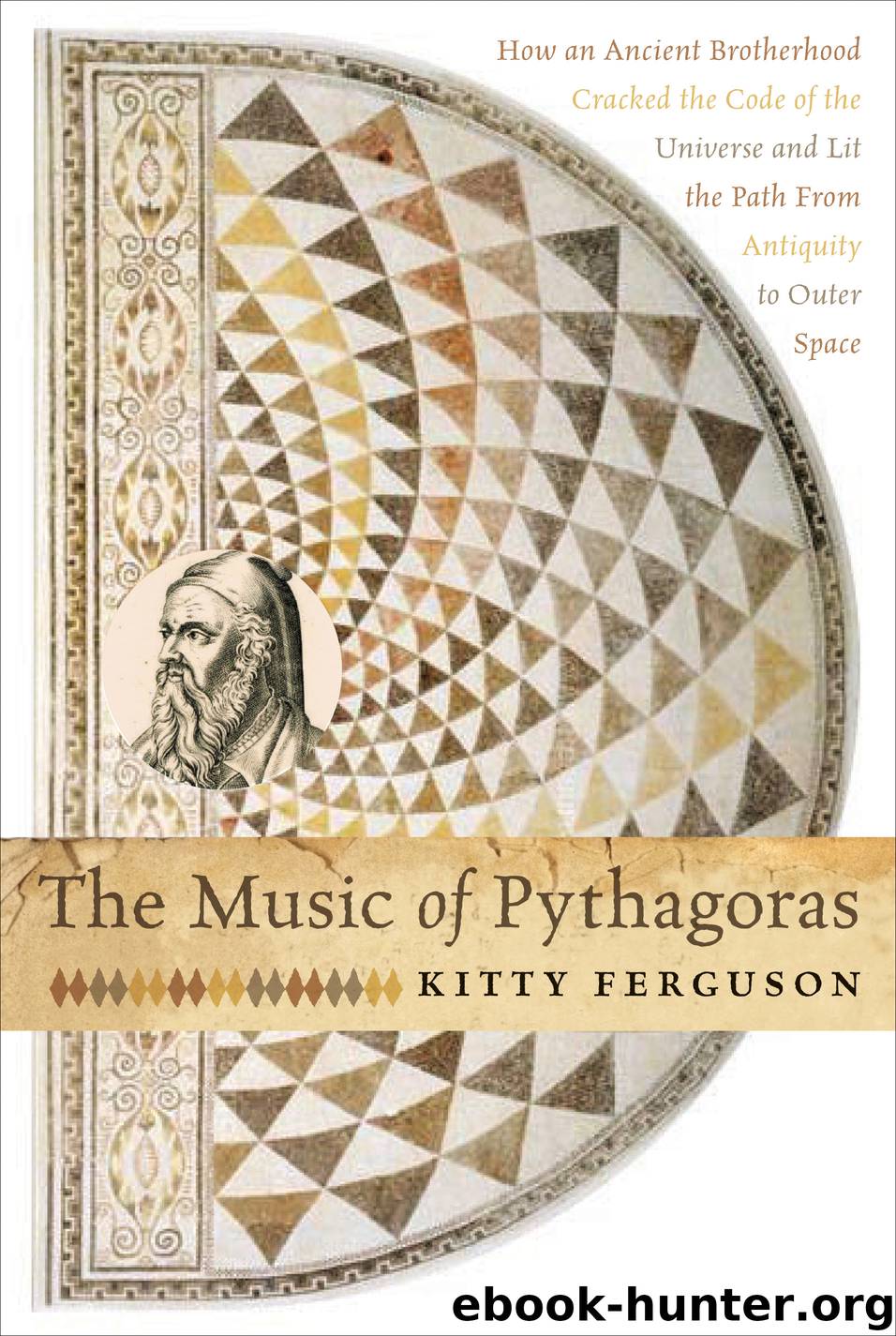The Music of Pythagoras by Kitty Ferguson

Author:Kitty Ferguson
Language: eng
Format: epub, mobi
Publisher: Bloomsbury Publishing Plc
Published: 2008-06-05T16:00:00+00:00
Plutarch, from a sixteenth-century engraving
Of all who thought that Plato derived his ideas from Pythagoras, no other was so convinced and outspoken as Moderatus of Gades, known as the “aggressive Pythagorean.” He lived in the second half of the first century, in Gades (later Cádiz) on the west coast of Spain, by then part of the Empire. Moderatus could be called the Pythagorean conspiracy theorist, for he insisted that not only Plato but also Aristotle, Speusippus, Aristoxenus, and Xenocrates were plagiarists who had “taken for themselves the fairest fruit of Pythagorean thought” and designated as “Pythagorean” only the most superficial and trivial aspects of the school, so as to make a mockery of Pythagoras and the Pythagoreans.14 The aphorisms were among those “superficial and trivial aspects,” and Aristotle’s listing of them was, to Moderatus, a malicious act. He scorned the acusmatici, and his answer to the argument that Aristoxenus also had scorned them was that Aristoxenus’ attitude was a particularly subtle part of the propaganda project against the true Pythagoreans.
Moderatus had a fresh take on the Pythagorean use of numbers, which helped explain how he thought the plagiarism had been engineered. The Pythagoreans, “for the sake of a lucid exposition,” wisely resorted to “explanation by means of numbers” because it was so difficult to explain the first principles and primary Forms clearly in language.15 For example, to say the One was above all else did not mean that the number 1 itself was the supreme fundamental of the universe. Instead, One stood for a great unifying principle, implying equality, everything that causes stability and unchangingness, the absence of “otherness.” In a “language” of numbers, the Pythagoreans had expressed everything that Plato would later attempt to express in words. Moderatus had got neatly past Aristotle’s stumbling block, the notion that numbers were, for the Pythagoreans, both abstract things and the physical building materials of the universe. In fact, he had made a jump into the twentieth century, when some found it easier to describe the quantum world and the origin of the universe in mathematical formulas than in imprecise descriptive words.
There had been hints before of a way of looking at the world in which physical matter was evil or at least negative, and in Moderatus this view came much more to the fore. Physical matter was a “shadow,” and that, to him, meant something more negative than it had to Plato. It was “not-being.” But Moderatus thought that everything including matter came from the One, and the One was “the Good.” He failed to address the question of how anything wholly good can produce evil, but the problem of the origin of evil was looming on the philosophical horizon.
At the opposite extreme of the Empire, in about A.D. 125, Theon of Smyrna wrote Mathematics Useful for Understanding Plato. It included arithmetic, harmonics, astronomy, geometry, the symbolism of the numbers 1 through 10, different forms of the tetractus, and the tetractus’ link with music and the cosmos.16 “The one who bestowed
Download
This site does not store any files on its server. We only index and link to content provided by other sites. Please contact the content providers to delete copyright contents if any and email us, we'll remove relevant links or contents immediately.
| France | Germany |
| Great Britain | Greece |
| Italy | Rome |
| Russia | Spain & Portugal |
Fanny Burney by Claire Harman(26594)
Empire of the Sikhs by Patwant Singh(23070)
Out of India by Michael Foss(16846)
Leonardo da Vinci by Walter Isaacson(13315)
Small Great Things by Jodi Picoult(7121)
The Six Wives Of Henry VIII (WOMEN IN HISTORY) by Fraser Antonia(5496)
The Wind in My Hair by Masih Alinejad(5089)
A Higher Loyalty: Truth, Lies, and Leadership by James Comey(4950)
The Crown by Robert Lacey(4805)
The Lonely City by Olivia Laing(4798)
Millionaire: The Philanderer, Gambler, and Duelist Who Invented Modern Finance by Janet Gleeson(4464)
The Iron Duke by The Iron Duke(4349)
Papillon (English) by Henri Charrière(4259)
Sticky Fingers by Joe Hagan(4188)
Joan of Arc by Mary Gordon(4099)
Alive: The Story of the Andes Survivors by Piers Paul Read(4017)
Stalin by Stephen Kotkin(3956)
Aleister Crowley: The Biography by Tobias Churton(3628)
Ants Among Elephants by Sujatha Gidla(3459)
